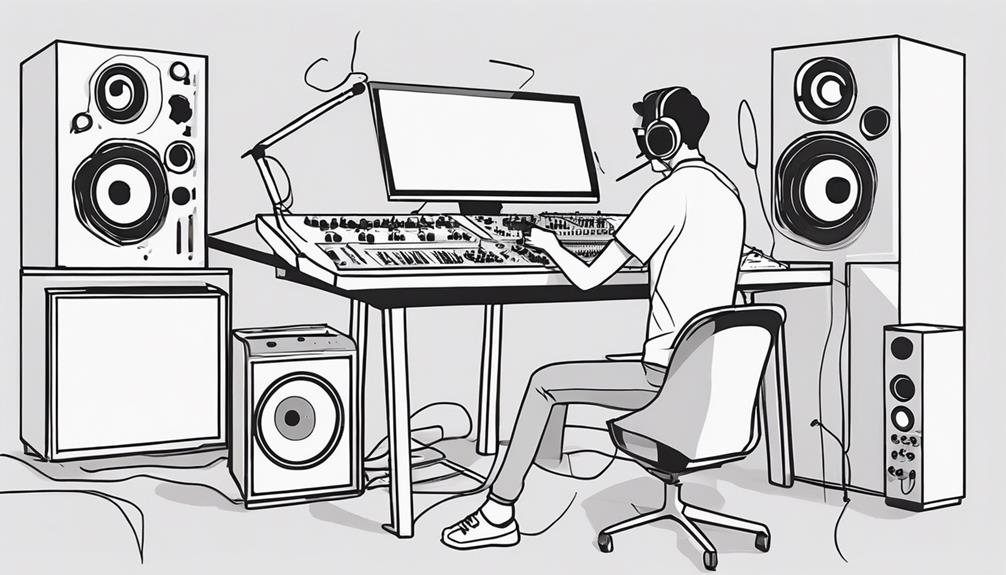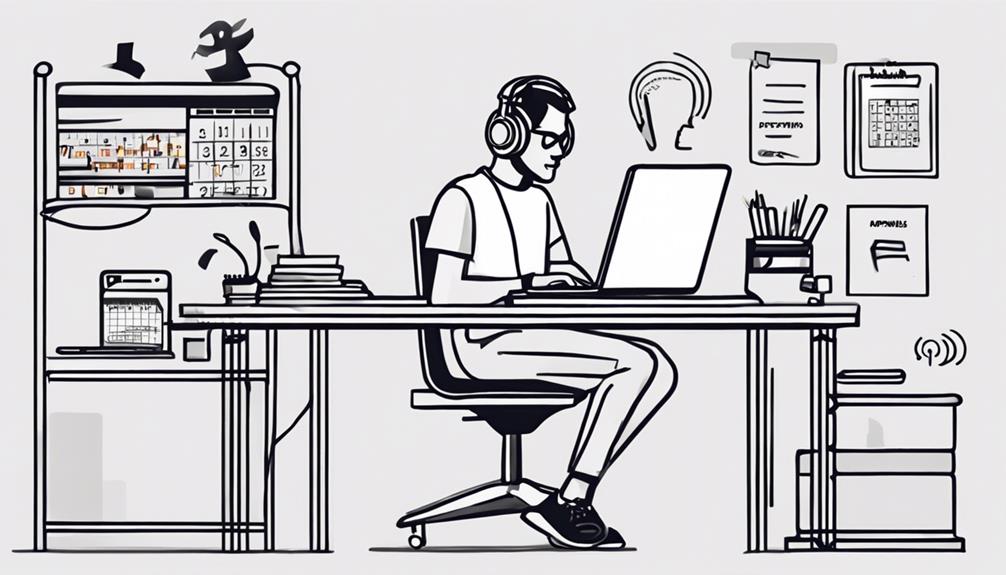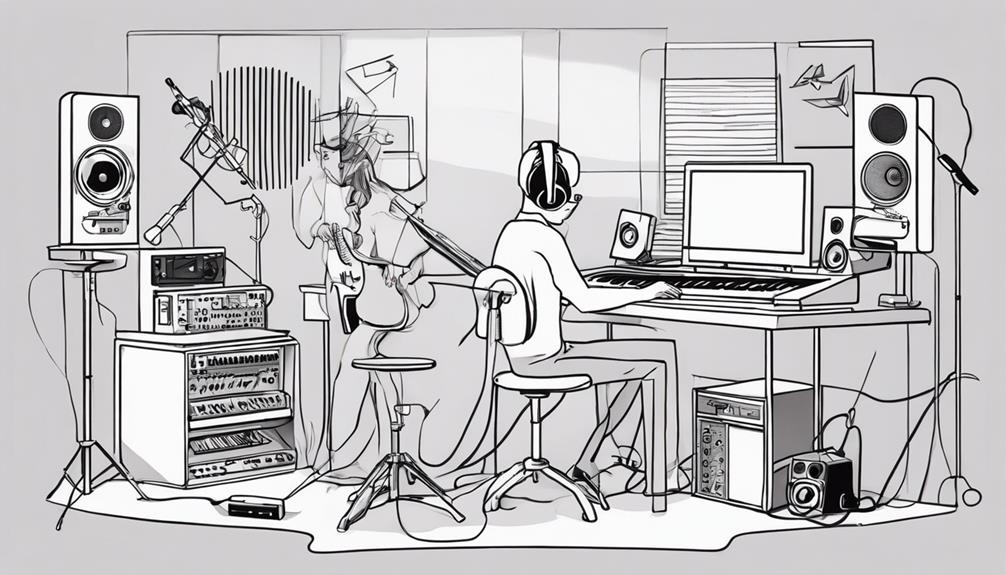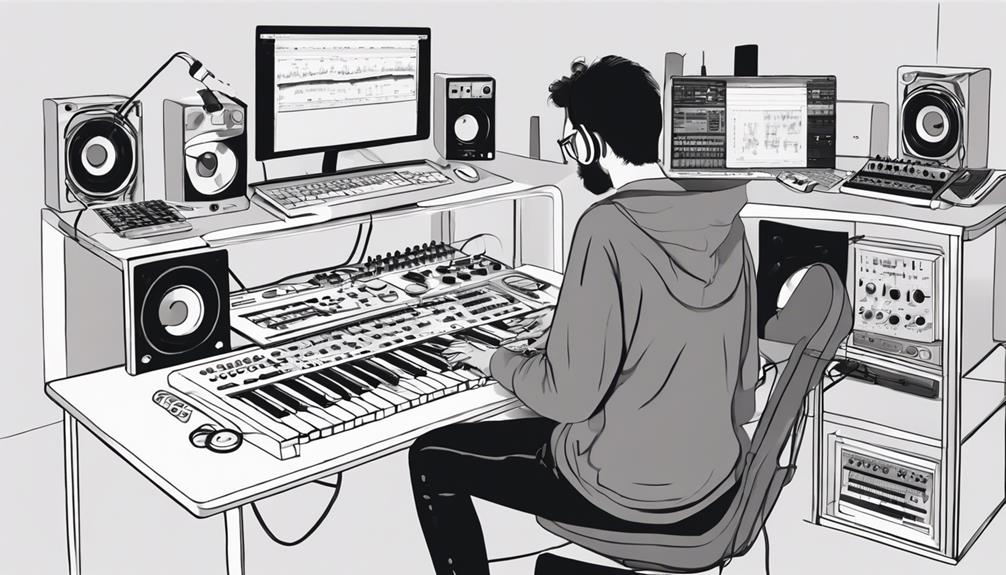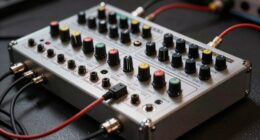Kickstart your music production career today by honing music theory, mastering software like Ableton Live, and experimenting with industry-standard tools. Invest in quality recording equipment and studio setup for professional results. Network with industry professionals, stay updated on trends, and continuously refine your craft through practice and collaborations. Gain hands-on experience through internships and local events. Take the first step towards a successful music production career!
Key Takeaways
- Learn music theory, mastering DAWs, and plugins for quality production.
- Invest in recording equipment, studio setup, and industry-standard software.
- Network, collaborate, and stay updated on trends for career growth.
- Gain hands-on experience through internships, workshops, and local events.
- Develop clear communication, teamwork, and seek mentorship for success.
Essential Skills for Music Producers
To succeed as a music producer, you must possess a strong understanding of music theory, composition, and instrument proficiency. This foundation allows you to effectively translate musical ideas into tangible productions.
Proficiency with music production software is paramount in today's industry. Programs like Ableton Live and Logic Pro offer powerful tools for sound synthesis, mixing, mastering, and audio manipulation. Understanding music theory enables you to compose and arrange tracks effectively, while instrument proficiency allows you to create authentic sounds.
Additionally, mastering production techniques is essential for creating high-quality music. Being able to utilize digital audio workstations (DAWs) features, plugins, and effects is critical for producing professional tracks.
Active listening, broadening your musical horizons, and analyzing production techniques also play an important role in your development as a music producer. By honing these skills, you can enhance your creativity and produce innovative and engaging music.
Industry-Standard Software and Equipment
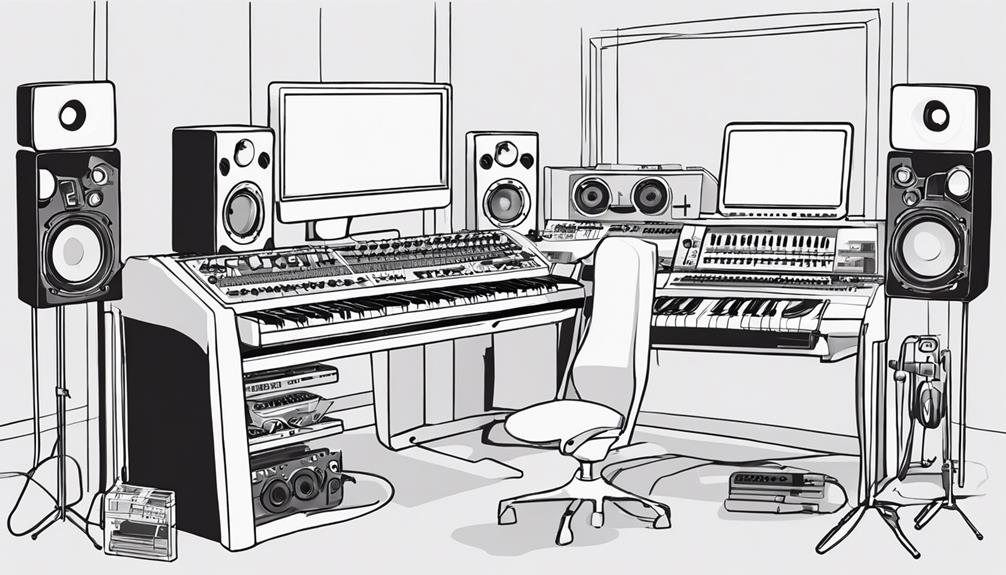
When working in music production, you must familiarize yourself with industry-standard software like Ableton Live, Logic Pro, Pro Tools, and FL Studio.
Equip yourself with essential tools such as MIDI controllers, audio interfaces, studio monitors, and microphones for quality recordings.
Setting up your studio with high-quality headphones, acoustic treatment, and professional equipment can greatly enhance your production workflow.
Essential Software Tools
Industry-standard software tools and equipment are essential for music production, ensuring professional quality in your work. When it comes to software, Pro Tools, Ableton Live, Logic Pro, and FL Studio are industry staples. Each of these Digital Audio Workstations (DAWs) offers unique features catering to different styles of music production.
Pro Tools is renowned for its advanced audio editing capabilities, while Ableton Live excels in live performance and electronic music production. Logic Pro is favored for its intuitive interface and extensive sound library, whereas FL Studio is popular among beatmakers for its easy-to-use interface and powerful step sequencer.
In addition to DAWs, plugins play a pivotal role in enhancing sound quality. Plugins from Waves, Native Instruments, and FabFilter are widely used for mixing and mastering tasks. Virtual instruments like Kontakt, Omnisphere, and Serum offer a vast array of sounds to elevate your music productions.
Understanding these software tools is essential for creating professional-grade music efficiently.
Quality Recording Equipment
For high-quality music production, integrating industry-standard software and equipment is crucial to guarantee professional results. To achieve this level of quality, consider the following essential recording equipment:
- Microphones: Invest in high-quality microphones from renowned brands like Neumann, Shure, and AKG to capture clear and crisp sound during recording sessions.
- Studio Monitors: Opt for studio monitors such as Yamaha HS8 and KRK Rokit for accurate sound reproduction, allowing you to mix and master your tracks effectively.
- Audio Interfaces: Ensure high-quality audio recording by using audio interfaces from trusted brands like Focusrite and Universal Audio, enabling seamless connectivity between your instruments and recording software.
- Essential Equipment: Enhance your music production capabilities with MIDI controllers, synthesizers, and outboard gear to add depth and creativity to your productions.
Studio Setup Basics
Considering the importance of a well-equipped studio for music production, understanding the basics of industry-standard software and equipment is vital. Industry-standard software such as Ableton Live, Logic Pro, Pro Tools, and FL Studio are commonly used for music production.
Essential equipment includes MIDI keyboards for creating melodies, studio monitors for accurate sound reproduction, audio interfaces for connecting instruments and microphones to the computer, and microphones for capturing vocals and instruments.
Knowledge of mixing boards, audio interfaces, and studio monitors is essential for setting up a professional music production studio. Understanding signal flow, acoustics, and room treatment is important for optimizing sound quality in a studio setup.
Additionally, familiarity with plugins, virtual instruments, and effects is key to creating professional-quality music productions. By mastering the use of these tools and equipment, you can create a conducive environment for producing high-quality music in your studio.
Formal Education and Internships
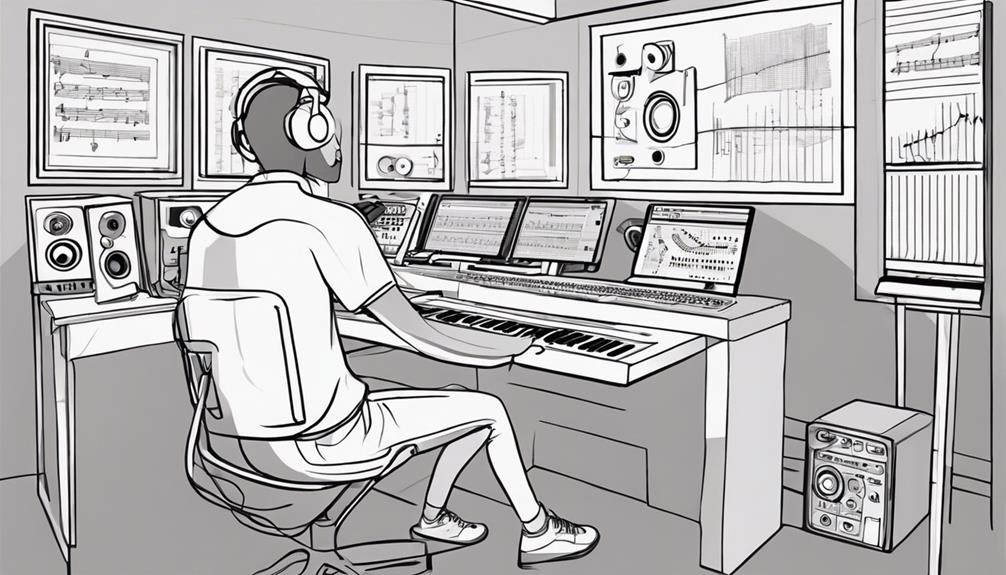
To excel in music production, obtaining formal education through a degree program and gaining hands-on experience via internships are essential steps in developing your skills and industry knowledge.
Here's how you can kickstart your career in music production:
- Pursue a degree in music production: Enroll in programs that offer specialized courses in audio engineering and music production to gain thorough knowledge and practical skills.
- Participate in internships: Seek opportunities to work in recording studios or with experienced professionals to acquire valuable hands-on experience and build connections in the industry.
- Engage with professors and volunteer: Interact with industry experts, seek mentorship, and volunteer for music-related activities to gain insights and enhance practical skills.
- Continuous learning through online courses: Stay updated with industry trends by enrolling in online courses and workshops to enhance your technical proficiency and expand your knowledge base.
Building a Strong Professional Network
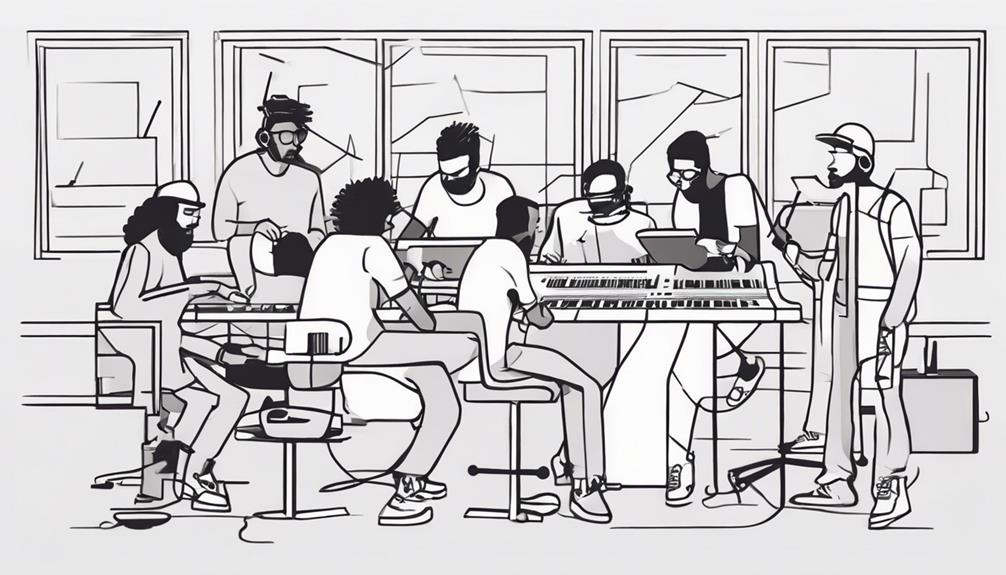
To succeed in music production, it's essential to establish a strong professional network. Start by attending industry events and workshops to connect with like-minded individuals.
Utilize online platforms and seek mentorship to expand your circle and gain valuable insights.
Networking Essentials for Success
Engage actively in music industry events and online communities to establish a strong professional network that can propel your career in music production. Networking is vital in the music industry, and here are some essential tips to help you build a robust network:
- Attend Industry Events: Make an effort to attend music industry events, conferences, and workshops to connect with professionals and expand your network.
- Utilize Social Media: Leverage platforms like LinkedIn and SoundCloud to network with industry peers, share your work, and stay updated on industry trends.
- Collaborate with Others: Collaborating on projects with fellow musicians, producers, and industry professionals is a great way to build relationships and showcase your skills.
- Seek Mentorship: Reach out to experienced music producers for mentorship. Their guidance can provide valuable insights, expand your network, and open doors to new opportunities.
Connecting With Industry Professionals
By actively participating in industry events and leveraging online platforms, you can effectively connect with industry professionals and build a strong professional network in music production. Attending music conferences and workshops provides valuable networking opportunities, allowing you to meet and engage with professionals in the field.
Online platforms like LinkedIn and industry forums offer additional avenues to connect with music producers and industry experts, expanding your network beyond physical events.
Seeking mentorship from experienced music producers can provide valuable insights and guidance as you navigate the industry. Collaborating with artists, engineers, and other professionals not only helps broaden your network but also creates opportunities for growth and learning.
Joining music production associations and organizations is another way to meet like-minded individuals and establish meaningful relationships within the industry. By actively engaging in networking, seeking mentorship, and fostering collaborations, you can strengthen your connections and pave the way for a successful career in music production.
Staying Updated on Trends and Technologies
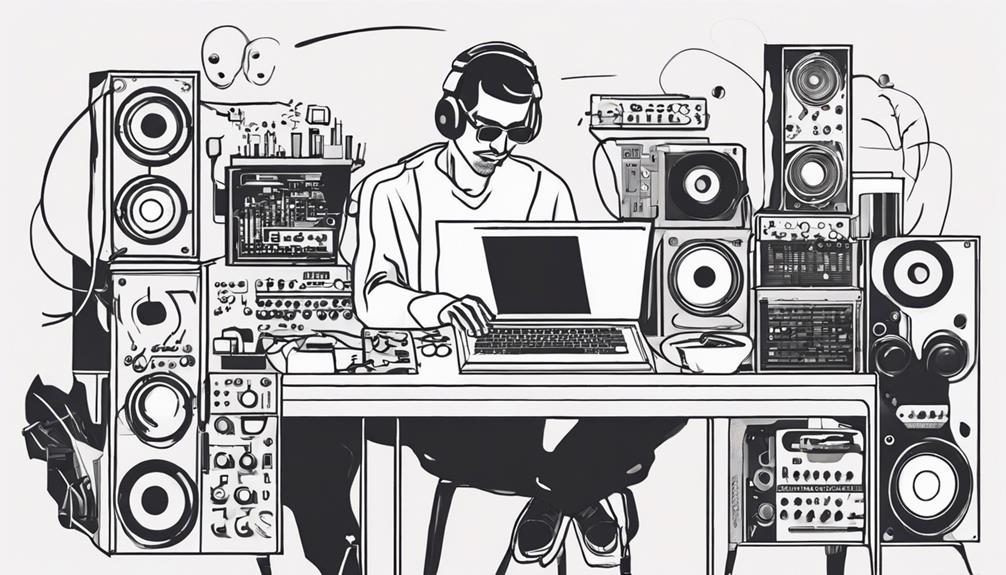
Keep yourself informed about the latest trends and technologies in music production. To stay ahead in the industry, make sure to:
- Stay Updated on Software: Regularly check for music production software updates to leverage new features and improve your workflow.
- Follow Industry Blogs: Read industry blogs, forums, and social media accounts to stay informed about evolving trends and technologies.
- Attend Workshops and Conferences: Participate in workshops, webinars, and conferences to discover cutting-edge tools and techniques used in music production.
- Join Online Communities: Connect with professionals in online communities and networking groups to discuss advancements in music production technology and exchange insights.
Continuous Craft Refinement
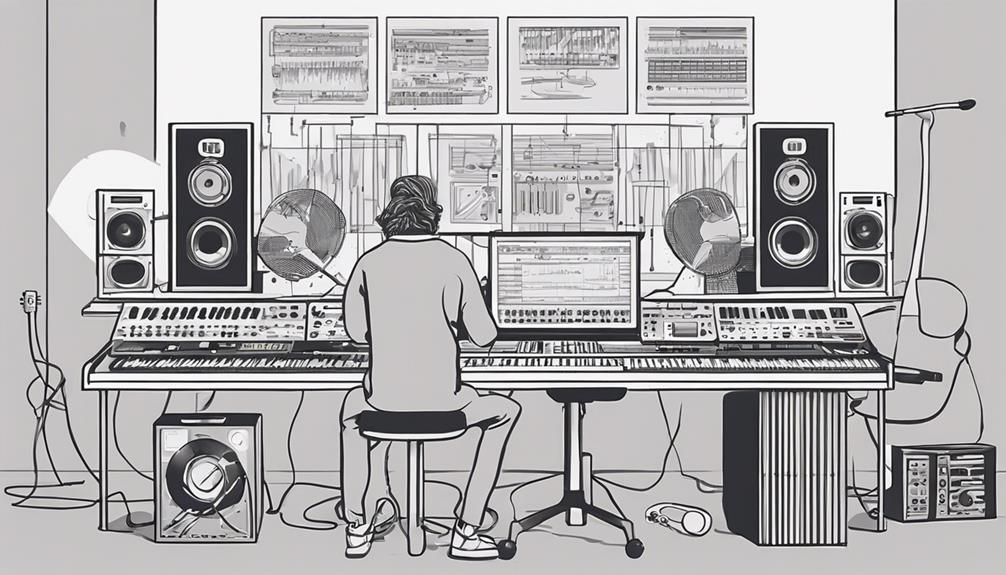
Refining your craft in music production requires consistent practice and a willingness to explore new techniques and technologies. Continuous improvement is key to staying relevant in this ever-evolving industry. Regular practice allows you to hone your skills and develop a unique style, while experimentation helps you push boundaries and discover innovative ways to create music. Embracing challenges as opportunities for growth will further enhance your craft refinement journey.
| Craft Refinement Strategies | Description | Benefits |
|---|---|---|
| Regular Practice | Dedicate time daily to work on your music production skills. | Enhances technical proficiency and creativity. |
| Experimentation | Try out new software, equipment, and techniques to expand your capabilities. | Encourages innovation and fresh ideas. |
| Seeking Feedback | Solicit input from peers and mentors to gain insights on areas for improvement. | Provides constructive criticism and different perspectives. |
| Collaboration | Work with other producers to learn new skills and gain diverse perspectives. | Fosters networking opportunities and knowledge exchange. |
| Industry Engagement | Attend workshops, courses, and events to stay updated on trends and technologies. | Keeps you informed about industry developments and best practices. |
Collaborating With Artists and Producers
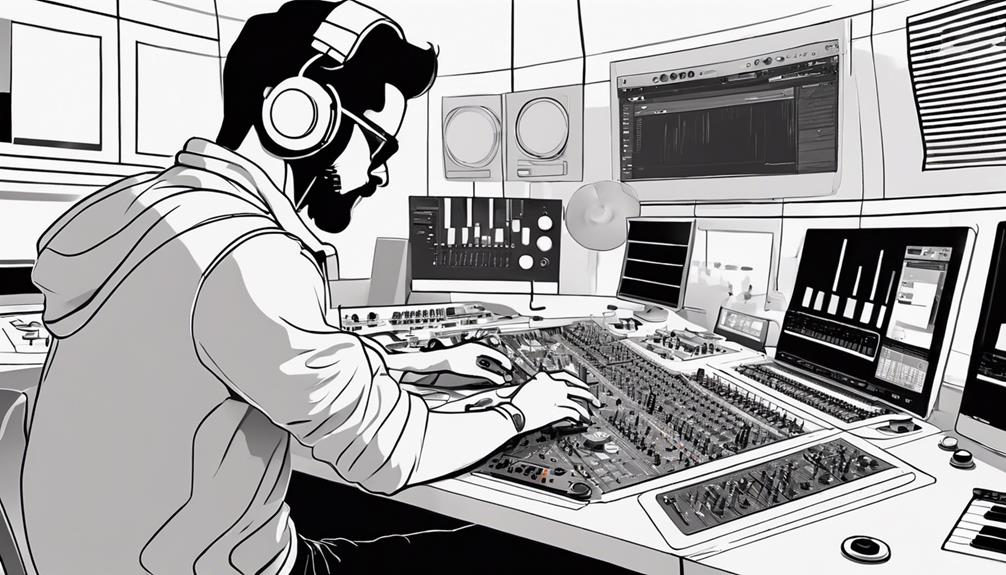
Establishing clear communication and mutual respect is crucial when collaborating with artists and producers in music production. Building strong relationships with your collaborators can lead to creative synergy and successful projects. To guarantee a fruitful collaboration, consider the following:
- Open Lines of Communication: Keep communication channels clear and open to exchange ideas, provide feedback, and address any concerns promptly.
- Understanding Each Other's Vision: Take the time to grasp the artistic vision and goals of your collaborators to align your efforts towards a common creative direction.
- Building Trust and Respect: Foster a respectful and trusting relationship with artists and producers to create a positive working environment that encourages creativity and innovation.
- Sharing Responsibilities and Ideas: Collaborate by sharing responsibilities, contributing ideas, and working together towards a shared goal to produce high-quality music that reflects the collective vision.
Hands-On Experience in Music Production
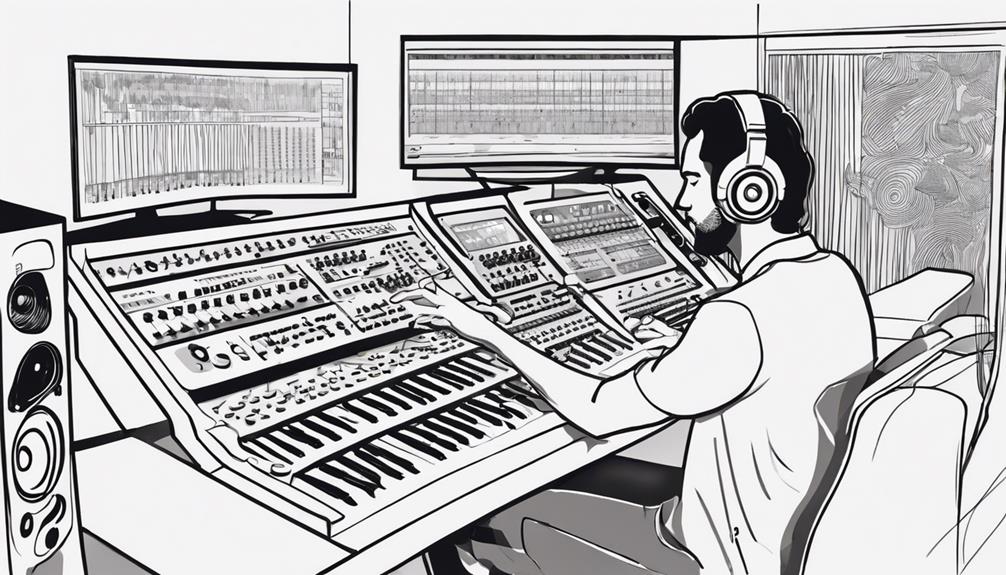
To enhance your skills in music production, actively seek hands-on experience through internships, workshops, collaborations, and industry events. Interning at recording studios or assisting music producers provides valuable insight into the professional music production process.
Participating in music production workshops and seminars allows you to hone your practical skills and learn about the latest technologies in the field. Collaborating with artists and musicians on projects helps you apply your knowledge in real-world scenarios, gaining hands-on experience in producing music across various genres.
Utilize professional recording equipment and software to enhance your production abilities and familiarize yourself with industry-standard tools. Additionally, volunteering for local music events or projects can provide you with valuable industry exposure, networking opportunities, and real-life experience in music production settings.
Standing Out in a Competitive Field
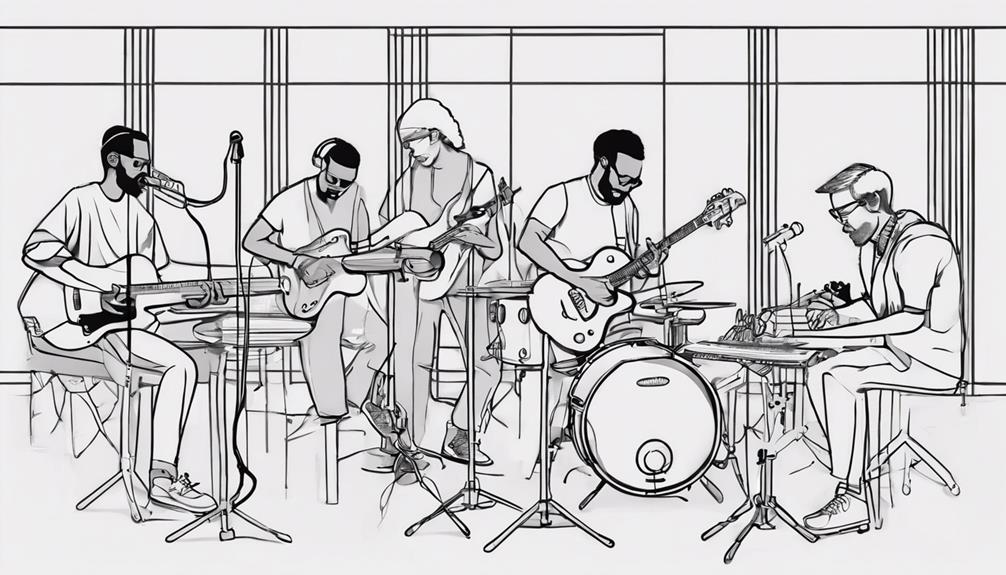
Developing a distinct set of skills and showcasing your unique strengths in music production will set you apart in a competitive field. To stand out as a music producer, consider the following:
- Highlight Your Unique Skills: Emphasize what makes you different from others in the industry. Whether it's a particular genre you excel in or a unique production technique you've mastered, let your strengths shine through.
- Showcase a Diverse Portfolio: Demonstrate your versatility by showcasing a range of projects you've worked on. Having a diverse portfolio will show potential clients or employers that you can handle various music production tasks effectively.
- Network with Industry Professionals: Building connections in the music industry can open up new opportunities for collaboration and growth. Seek mentorship from experienced professionals to gain valuable insights and guidance.
- Pursue Continuous Learning: Stay updated with the latest trends and technologies in music production. Continuous learning and training won't only enhance your skills but also keep you competitive in the ever-evolving music industry landscape.
Frequently Asked Questions
How to Start a Career in Music Production?
To kickstart your music production career, gain experience through internships, build a solid portfolio, network with industry pros, consider formal education, and stay updated on trends. These steps will pave the way for success in the field. Additionally, focus on honing your unique sound and developing a personal brand that sets you apart in the competitive industry. By mastering your craft and leveraging platforms like social media and streaming services, you can effectively make money with music production while reaching a wider audience. Remember, consistency and persistence are key to turning your passion into a sustainable career.
How Do I Get My Music Career Started?
To kickstart your music career, immerse yourself in internships, create a killer portfolio, and network like a pro. Consider pursuing a degree or certificate. Display your work online. Success doesn't come overnight, but with dedication, you'll make it happen.
Can You Make a Career Out of Music Production?
Yes, you can make a career out of music production. It involves blending creativity, technical skills, and networking. Collaborate with artists, shape tracks, and adapt to industry trends. Embrace technology like digital workstations for a successful music production career.
How Do I Get Work Experience in Music Production?
To get work experience in music production, seek internships at studios, volunteer at music events, shadow experienced producers, collaborate with artists, and attend workshops. These steps will help you build skills, network, and enhance your career prospects.
Conclusion
Now that you have the tools and skills to immerse yourself in music production, it's time to turn up the volume and let your creativity flow. Don’t hold back—experiment fearlessly with new sounds, styles, and techniques to find your unique voice in the ever-evolving world of music. Remember, the journey is just as important as the destination, so embrace the process and celebrate your progress along the way. And if you ever find yourself wondering how to quit music production, take a moment to reconnect with the passion that first drew you to it—sometimes, a break or new perspective is all you need to reignite your spark.
Like a conductor leading an orchestra, you have the power to shape sound and create masterpieces. Embrace the challenges, seek out opportunities, and never stop learning.
Your journey in music production is just beginning, and the stage is set for you to shine bright like a melody in the night sky. Let your passion drive you forward!

